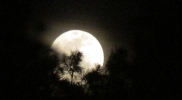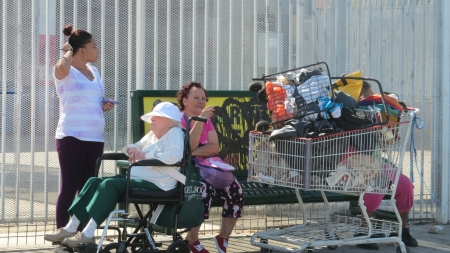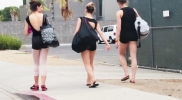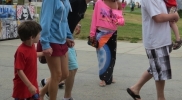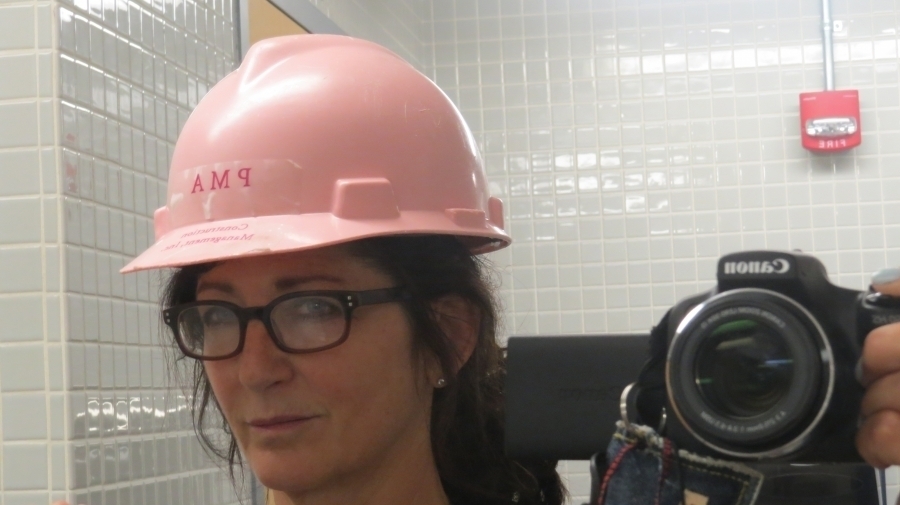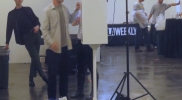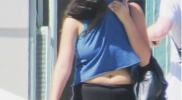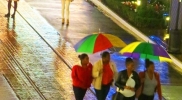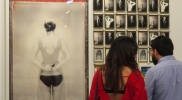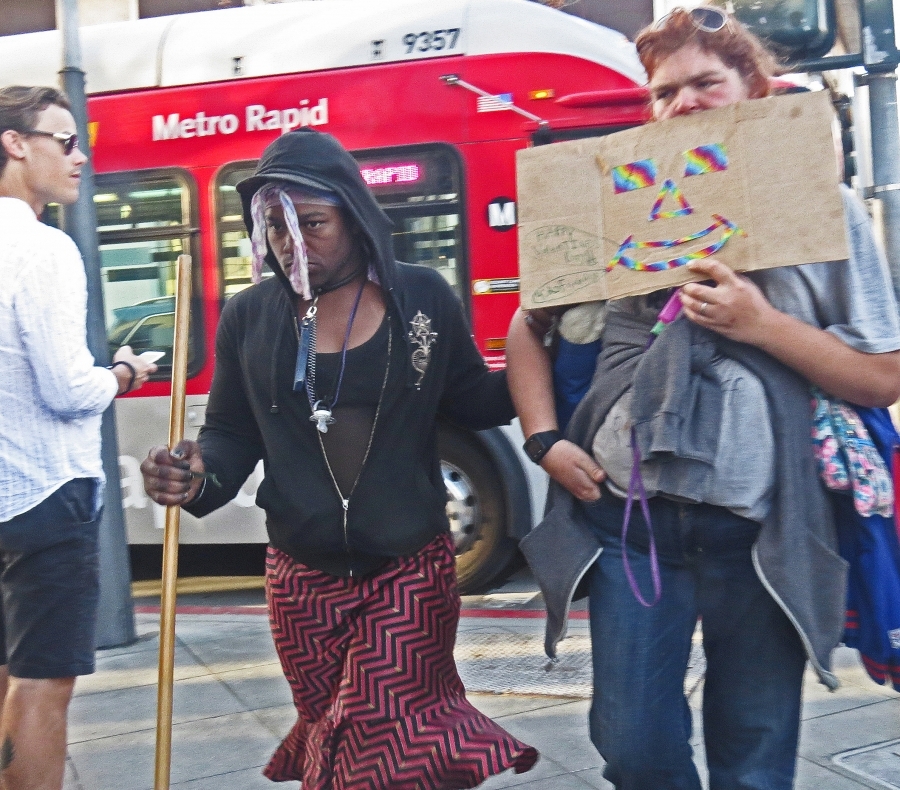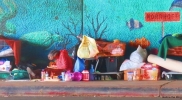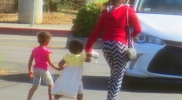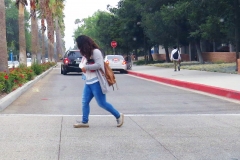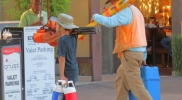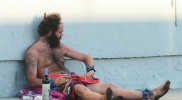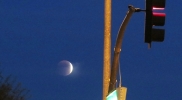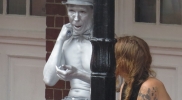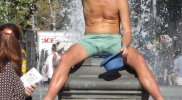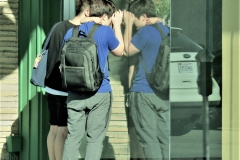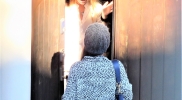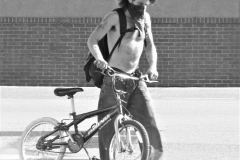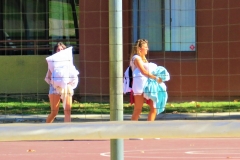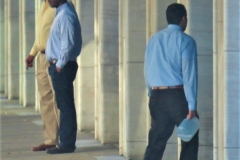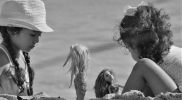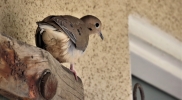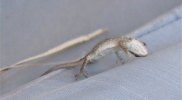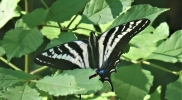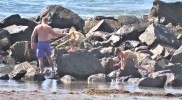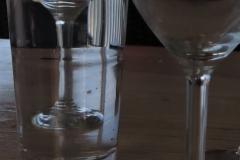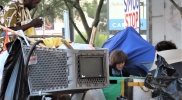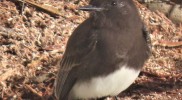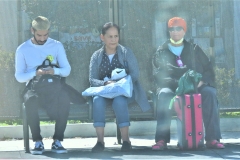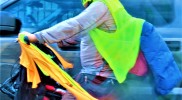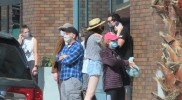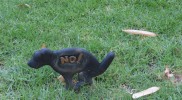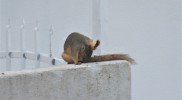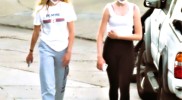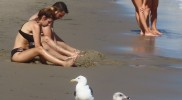|
|
Best Poems - Death
Best Poems – DEATH
|
| |
Death – John Alspaugh
"In this warming season, on the plains
The armless torsos of tornados
Rear up like colossal Venus de Milos,
And the black ceiling
Of sky drains out, the belly-
Dancing funnels whirl,
Spun by the souls of those about to die.
Of those who do not yet know
Their time has come
To wave goodbye.
But they cannot
For they do not know how
Or why."
|
| |
In View Of The Fact – A.R. Ammons
"The people of my time are passing away: my
wife is baking for a funeral, a 60-year-old who
died suddenly, when the phone rings, and it's
Ruth we care so much about in intensive care:
it was once weddings that came so thick and
fast, and then, first babies, such a hullabaloo:
now, it's this that and the other and somebody
else gone or on the brink: well, we never
thought we would live forever (although we did)
and now it looks like we won't: some of us
are losing a leg to diabetes, some don't know
what they went downstairs for, some know that
a hired watchful person is around, some like
to touch the cane tip into something steady,
so nice: we have already lost so many,
brushed the loss of ourselves ourselves: our
address books for so long a slow scramble now
are palimpsests, scribbles and scratches: our
index cards for Christmases, birthdays,
halloweens drop clean away into sympathies:
at the same time we are getting used to so
many leaving, we are hanging on with a grip
to the ones left: we are not giving up on the
congestive heart failures or brain tumors, on
the nice old men left in empty houses or on
the widows who decide to travel a lot: we
think the sun may shine someday when we'll
drink wine together and think of what used to
be: until we die we will remember every
single thing, recall every word, love every
loss: then we will, as we must, leave it to
others to love, love that can grow brighter
and deeper till the very end, gaining strength
and getting more precious all the way. . . ."
|
On The Threshold – Anonymous “I AM STANDING on the threshold of eternity at last,
As reckless of the future as I have been of the past;
I am void of all ambition, I am dead of every hope;
The coil of life is ended; I am letting go the rope.I have drifted down the stream of life till weary, sore oppressed;
And I’m tired of all the motion and simply want a rest.
I have tasted all the pleasures that life can hold for man.
I have scanned the whole world over till there’s nothing left to scan.I have heard the finest music, I have read the rarest books,
I have drunk the purest vintage, I have tasted all the cooks;
I have run the scale of living and have sounded every tone,
There is nothing left to live for and I long to be alone.
Alone and unmolested where the vultures do not rave,
And the only refuge left me is the quiet, placid grave;
I am judge and jury mingled, and the verdict that I give
Is, that minus friends and money it is foolishness to live.
In a day or two my body will be found out in the lake;
The coroner will get a fee; and the printer get a ” take “;
The usual verdict—” Suicide, from causes yet unknown.”
And Golgotha draws another blank, a mound without a stone.
To change the usual verdict I will give the reason now,
Before the rigid seal of death is stamped upon my brow.
‘Tis the old familiar story of passion, love and crime,
Repeated thru the ages since Cleopatra’s time.
A woman’s lips, a woman’s eye—a siren all in all,
A modern Circe fit to cause the strongest men to fall;
A wedded life, some blissful years, and poverty drops in
With care and doubt and liquor from whisky down to gin.
The story told by Tolstoi in comparison to mine
Is moonlight unto sunlight, as water unto wine;
The jealous pangs I suffered, the sleepless nights of woe
I pray no other mortal may ever undergo.
But I’ve said enough, I fancy, to make the reason plain—
Enough to show the causes of a shattered heart and brain;
What wonder then that life holds not a single thread to bind
A wish or hope to live for, an interest in mankind.
Already dead but living, a fact that I regret,
A man without desire excepting to forget;
And since there is denied me one, why should I linger here,
A dead leaf from the frost of a long-forgotten year?
So au revoir, old cronies; if there’s a meeting place beyond,
I’ll let you know in spirit, and I know you will respond;
I’m going now, old comrades, to heaven or to hell;
I’ll let you know which shortly—farewell, a long farewell.” |
Blues – W. H. Auden “Ladies and gentlemen, sitting there,
Eating and drinking and warming a chair,
Feeling and thinking and drawing your breath,
Who’s sitting next to you? It may be Death.As a high-stepping blondie with eyes of blue
In the subway, on beaches, Death looks at you;
And married or single or young or old,
You’ll become a sugar daddy and do as you’re told.Death is a G-man. You may think yourself smart,
But he’ll send you to the hot-seat or plug you through the heart;
He may be a slow worker, but in the end
He’ll get you for the crime of being born, my friend.
Death as a doctor has first-class degrees;
The world is on his panel; he charges no fees;
He listens to your chest, says—’You’re breathing. That’s bad.
But don’t worry; we’ll soon see to that, my lad.’
Death knocks at your door selling real estate,
The value of which will not depreciate;
It’s easy, it’s convenient, it’s old world. You’ll sign,
Whatever your income, on the dotted line.
Death as a teacher is simply grand;
The dumbest pupil can understand.
He has only one subject and that is the Tomb;
But no one ever yawns or asks to leave the room.
So whether you’re standing broke in the rain,
Or playing poker or drinking champagne,
Death’s looking for you, he’s already on the way,
So look out for him to-morrow or perhaps to-day.” |
| |
First Death In Nova Scotia – Elizabeth Bishop “In the cold, cold parlor
my mother laid out Arthur
beneath the chromographs:
Edward, Prince of Wales,
with Princess Alexandra,
and King George with Queen Mary.
Below them on the table
stood a stuffed loon
shot and stuffed by Uncle
Arthur, Arthur’s father.Since Uncle Arthur fired
a bullet into him,
he hadn’t said a word.
He kept his own counsel
on his white, frozen lake,
the marble-topped table.
His breast was deep and white,
cold and caressable;
his eyes were red glass,
much to be desired.‘Come,’ said my mother,
‘Come and say good-bye
to your little cousin Arthur.’
I was lifted up and given
one lily of the valley
to put in Arthur’s hand.
Arthur’s coffin was
a little frosted cake,
and the red-eyed loon eyed it
from his white, frozen lake.
Arthur was very small.
He was all white, like a doll
that hadn’t been painted yet.
Jack Frost had started to paint him
the way he always painted
the Maple Leaf (Forever).
He had just begun on his hair,
a few red strokes, and then
Jack Frost had dropped the brush
and left him white, forever.
The gracious royal couples
were warm in red and ermine;
their feet were well wrapped up
in the ladies’ ermine trains.
They invited Arthur to be
the smallest page at court.
But how could Arthur go,
clutching his tiny lily,
with his eyes shut up so tight
and the roads deep in snow?” |
| |
Oh Death, Rock Me Asleep – Anne Boleyn
(Written two days before her beheading at the Tower of London on May 19, 1536) “Oh death, rock me asleep,
Bring on my quiet rest;
Let pass my guileless ghost
Out of my careful breast;
Ring out the doleful knell,
Let it sound my death bell,—
for I must die; there is no remedy—
For now I die.
My pains who can express?
Alas! they are so strong,
My dolor will not suffer strength
My life for to prolong.
Alone in prison strange
I wait my destiny.
Woe worth this cruel hap, that I
Should taste this misery.
Farewell, my pleasure past;
Welcome my present pain.
I feel my torments so increase,
That life cannot remain.
Sound now the passing bell:
Rung is my doleful knell,
For its sound doth tell
Death doth draw nigh.
Sound the knell dolefully,
For now I die.” |
| |
| Before The Birth Of One Of Her Children – Anne Bradstreet
“All things within this fading world hath end,
Adversity doth still our joys attend;
No ties so strong, no friends so dear and sweet,
But with death’s parting blow is sure to meet.
The sentence past is most irrevocable,
A common thing, yet oh inevitable;
How soon, my dear, death may my steps attend,
How soon’t may be thy lot to lose thy friend;
We both are ignorant, yet love bids me
These farewell lines to recommend to thee,
That when that knot’s untied that made us one,
I may seem thine, who in effect am none.
And if I see not half my days that’s due,
What nature would, God grant to yours and you;
The many faults that well you know I have,
Let be interr’d in my oblivious grave;
If any worth or virtue were in me,
Let that live freshly in thy memory,
And when thou feel’st no grief, as I no harms,
Yet love thy dead, who long lay in thine arms:
And when thy loss shall be repaid with gains,
Look to my little babes, my dear remains.
And if thou love thyself, or loved’st me,
These O protect from step-dames injury.
And if chance to thine eyes shall bring this verse,
With some sad sighs honor my absent Hearse;
And kiss this paper for thy dear love’s sake,
Who with salt tears this last farewell did take.”
|
| |
We Real Cool – Gwendolyn Brooks
The Pool Players.
Seven at the Golden Shovel.“We real cool. We
Left school. We
Lurk late. We
Strike straight. We
Sing sin. We
Thin gin. We
Jazz June. We
Die soon.” |
Pan del Muerto – Kurt Brown “In Mexico, they bake bread
for those who died—flat
little cakes they leave around the house
for a mother or father or a child
to find. The dead are living
like us, growing fat, paying their debts,
brushing their teeth on schedule.
Sometimes it’s hard to make your way
across a room to shake someone’s
hand or give them a drink. The dead
are always there, in their evening gowns
and tuxedoes, expecting to be served—
asking for more crackers or champagne.
Just making love is a sacrilege!
The grandmother is there and the school
teacher and the delicate sister,
even those who are not yet born,
more innocent than babies. You get
up in the morning to comb your
hair and you are combing the brittle hair
of the dead, which goes on growing
like the eyelids and the finger
nails, as if the body were the last
to know or simply stubborn.
And maybe that’s what the cakes are for—
to nourish the vanity of the corpse,
who after all would like to look
as good as possible on such a great
occasion. Listen! You hear the leaves
cracking faintly at dusk, a tire humming
on dry pavement, the sound of water
rushing through a pipe? The dead
are hungry! You must take
your knives and bowls and go down
into the cellar; you must begin to chant
those old recipes you’ve been saving—
mixing your own blood with the dry
sand the dead grow fat on,
that the children of the dead roll
into loaves for you to eat—
for the dust that will eventually pass
entirely through you.” |
When Nothing More Can Be Done – Fran Chalin (a hospice chaplain) Published in The Los Angeles Times, July 12, 2020 “He came into the Orange County hospital because he had trouble breathing.
A week later the sign ‘caution droplets’ hung on his ICU room door
‘Droplets,’ code for COVID-19.
He hasn’t been conscious for 36 hours.
Only the ventilator keeps him alive.
Together, the doctor, hospice social worker and I tell the family nothing more can be done.
They nod, they have no fight left.
The doctor hates that he cannot save this man.
But he can allow them to say goodbye.
He tells them they can go in groups of two for 10 minutes.
He leaves us. He has to help someone else.
He cares for two floors of people with COVID-19, 51 people in all.
We tell them this is special, the doctor hasn’t allowed this before.
They mumble thanks. Translation: Isn’t that generous of you.
I stand outside the window into his room. When the 10 minutes are up, I wave.
His family members’ eyes plead, two fingers in the air, two minutes?
They smile and laugh in his room in case he can sense them.
But they sob once they slide shut his door.
The final two are his wife and first-born.
She collapses when she reaches his bed.
Their son barely catches her.
She kisses her husband, whispers in his ear.
I hope he senses her near him.
They don’t look at me when they walk away.
While hospital staffers extract the breathing tube
the social worker and I wait outside his room
because microscopic COVID-19 droplets will release into the air.
Once the tube is removed we prepare to enter his room.
We don’t have to go in, but we do. Mostly for him,
but for the staffers as well. They should have support too.
We sanitize our hands, then don gloves.
Then the N95 mask,
hairnet,
face shield,
then gown.
It’s uncomfortable, but it’s also keeping us alive.
Probably.
The staffers inspect us.
They are the best of humankind.
I ask if co-workers have had the virus.
Sure, they say. They point to the ones who recovered and are back working.
I don’t ask if any co-workers died. They have to focus on now.
Staffers adjust his medications.
He won’t feel the removal of the tube.
His family had asked if they could FaceTime
after the tube is removed.
The social worker holds up the phone.
I hold the patient’s hand. We hear his family:
‘We love you, be at peace, go with God.’
The social worker is used to being around the dying, but this is different.
Ten minutes is not long enough to say goodbye.
She’s young, this is her first pandemic.
She was a child when people with AIDS died every day for years.
I was there, I was 25.
There wasn’t enough time then either.
We all watch the monitor, the lines become flatter.
We hear his last breath. Then nothing.
The nurse nods to us.
The social worker tells the family that he’s gone to be with God.
I don’t have her faith.
I don’t know where he’s going except to the morgue.
His relatives are wailing. We try to say how sorry we are, but they’ve hung up.
Does anyone else feel like they’ve just witnessed an execution?
We slide the door open, just enough to get out.
There is a receptacle for the shield and the hairnet.
I put my N95 into a plastic bag to leave out in the sun at home.
There aren’t enough of these masks to have a new one every time, but the nurse says, “It’s OK.
Just put it in the sun, the virus dies in the sun.”
I hope she’s right.
COVID-19 is disproportionately killing Black and brown people.
I’ve heard people speculate: Didn’t they all have lung issues,
or diabetes, or health problems that
made them more likely to get infected and die?
That sounds a lot like: Didn’t gays and IV drug users bring AIDS on themselves?
Disposable populations.
Outside the hospital there is a billboard.
‘HEROES WORK HERE.’ I want to scream.
Hero is just another word for better you than me.
The social worker calls me the next morning. She couldn’t sleep.
‘This was bad,’ she says with a sigh, ‘I’ll see you at the hospital soon.’
And now the memory comes back full force.
The other pandemic, AIDS.
Caring for the next person, and the next one.
I’m worried about myself and feeling guilty for even thinking about myself.
I’m worried I’ll forget that balance is important.
Forty years later, there is still the next one and the next one.
So tell me: Why aren’t you wearing a mask?” |
| |
On The Death Of A Next-Door Neighbor – Billy Collins “So much younger and with a tall, young son
in the house above ours on a hill,
it seemed that death had blundered once again.Was it poor directions, the blurring rain,
or the too-small numerals on the mailbox
that sent his dark car up the wrong winding driveway?Surely, it was me he was looking for—
overripe, childless, gaudy with appetite,
the one who should be ghosting over the rooftops
not standing barefooted in this kitchen
on a sun-shot October morning
after eight days and nights of downpour,
me with my presumptuous breathing,
my arrogant need for coffee,
my love of the colorful leaves beyond the windows.
The weight of my clothes, not his,
might be hanging in the darkness of a closet today,
my rake idle, my pen across a notebook.
The harmony of this house, not his,
might be missing a voice,
the hallways jumpy with the cry of the telephone—
if only death had consulted his cracked leather map,
then bent to wipe the fog
from the windshield with an empty sleeve.” |
| |
Studying – Miles A. Coon “I studied for my law school finals
at the city morgue
where I wore
coroner’s credentials on my shirts.
At rest beside my text,
a list of stiffs, an inventory
of the dead.It wasn’t easy reading law,
while trying to ignore
the wails of recognition
that came with the opening of a drawer.
The poorest of the poor
wound up there—the ones who died
on the street, victimsof violence, the elements,
and indifference. To keep
my distance, I affixed
a cold bureaucratic face,
closed myself off
from the families who sought the murdered,
raped, kidnapped, the missing,
and the lost.
My law books were full of theories,
why punishment could not deter.
But I saw the bodies of
murdered children, who’d been sold
for pleasure, mutilated women, killed
for the joy of killing women.
So then, I worked in Sing-Sing
where the guilty were put to death.
I watched them walk
the last mile
from their ‘Dance Hall’ holding cells
to the Death House.
I studied well, their executions
in The Chair. I learned by heart
the law: if one takes a life, so his life
shall be taken. I grew to relish
each and every execution,
delivered, certain and swift,
without disturbing interruptions.” |
| |
ViVa: you in winter – e. e. cummings “you
in win
ter who sit
dying thinking
huddled behind dir
ty glass mind muddled
and cuddled by dreams (or some
times vacantly gazing through un
washed panes into a crisp todo of
murdering uncouth faces which pass rap
idly with their breaths.) ‘people are walking deaths
in this season’ think ‘finality lives up
on them a little more openly than usual
hither, thither who briskly busily carry the as
tonishing & spontaneous & difficult ugliness
of themselves with a more incisive simplicity a
more intensively brutal futility’ And sit
huddling dumbly behind three or two partly tran
sparent panes which by some loveless trick sepa
rate one stilled unmoving mind from a hun
dred doomed hurrying brains (by twos
or threes which fiercely rapidly
pass with their breaths) in win
ter you think,die slow
ly ‘toc-tic’ as i
have seen trees (in
whose black bod
ies leaves
hide)” |
| |
XAIPE*: dying is fine – e. e. cummings “dying is fine) but Death?o
baby
iwouldn’t like
Death if death
were
good: for
when (instead of stopping to think) you
begin to feel of it,dying
‘s miraculous
why?be
cause dying is
perfectly natural;perfectly
putting
it mildly lively(but
Death
is strictly
scientific
& artificial &
evil & legal)
we thank thee
god
almightly for dying
(forgive us,o life!the sin of Death”
* Xaipe pronounced Khai.er.ree (rhymes with fiery); Greek for rejoice |
| |
If I Should Die – Emily Dickinson “If I should die,
And you should live,
And time should gurgle on,
And morn should beam,
And noon should burn,
As it has usual done;
If birds should build as early,
And bees as bustling go,—
One might depart at option
From enterprise below!
‘Tis sweet to know that stocks will stand
When we with daisies lie,
That commerce will continue,
And trades as briskly fly.
It makes the parting tranquil
And keeps the soul serene,
That gentlemen so sprightly
Conduct the pleasing scene!” |
| |
Drowning Is Not So Pitiful – Emily Dickinson “Drowning is not so pitiful
As the attempt to rise.
Three times, ’tis said, a sinking man
Comes up to face the skies,
And then declines forever
To that abhorred abode,
Where hope and he part company—
For he is grasped of God.
The Maker’s cordial visage,
However good to see,
Is shunned, we must admit it,
Like an adversity.” |
| |
To Know Just How He Suffered Would Be Dear – Emily Dickinson “To know just how he suffered would be dear;
To know if any human eyes were near
To whom he could intrust his wavering gaze,
Until it settle firm on Paradise.To know if he was patient, part content,
Was dying as he thought, or different;
Was it a pleasant day to die,
And did the sunshine face his way?What was his furthest mind, of home, or God,
Or what the distant say
At news that he ceased human nature
On such a day?
And wishes, had he any?
Just his sigh, accented,
Had been legible to me.
And was he confident until
Ill fluttered out in everlasting well?
And if he spoke, what name was best,
What first,
What one broke off with
At the drowsiest?
Was he afraid, or tranquil?
Might he know
How conscious consciousness could grow,
Till love that was, and love too blest to be,
Meet—and the junction be Eternity?” |
| |
Because I Could Not Stop For Death – Emily Dickinson “Because I could not stop for Death,
He kindly stopped for me;
The carriage held but just ourselves
And Immortality.We slowly drove, he knew no haste,
And I had put away
My labor, and my leisure too,
For his civility. We passed the school where children played
At wrestling in a ring;
We passed the fields of gazing grain,
We passed the setting sun.
We paused before a house that seemed
A swelling of the ground;
The roof was scarcely visible,
The cornice but a mound.
Since then ‘t is centuries; but each
Feels shorter than the day
I first surmised the horses’ heads
Were toward eternity.” |
| |
Brilliance – Mark Doty “Maggie’s taking care of a man
who’s dying; he’s attended to everything,
said goodbye to his parents,paid off his credit card.
She says Why don’t you just
run it up to the limit?but he wants everything
squared away, no balance owed,
though he misses the pets
he’s already found a home for
—he can’t be around dogs or cats,
too much risk. He says,
I can’t have anything.
She says, A bowl of goldfish?
He says he doesn’t want to start
with anything and then describes
the kind he’d maybe like,
how their tails would fan
to a gold flaring. They talk
about hot jewel tones,
gold lacquer, say maybe
they’ll go pick some out
though he can’t go much of anywhere and then
abruptly he says I can’t love
anything I can’t finish.
He says it like he’s had enough
of the whole scintillant world,
though what he means is
he’ll never be satisfied and therefore
has established this discipline,
a kind of severe rehearsal.
That’s where they leave it,
him looking out the window,
her knitting as she does because
she needs to do something.
Later he leaves a message:
Yes to the bowl of goldfish.
Meaning: let me go, if I have to,
in brilliance. In a story I read,
a Zen master who’d perfected
his detachment from the things of the world
remembered, at the moment of dying,
a deer he used to feed in the park
and wondered who might care for it,
and at that instant was reborn
in the stunned flesh of a fawn.
So, Maggie’s friend—
is he going out
into the last loved object
of his attention?
Fanning the veined translucence
of an opulent tail,
undulant in some uncapturable curve,
is he bronze chrysanthemums,
copper leaf, hurried darting,
doubloons, icon-colored fins
troubling the water?” |
January 1940 – Roy Fuller “Swift had pains in his head.
Johnson dying in bed
Tapped the dropsy himself.
Blake saw a flea and an elf.
Tennyson could hear the shriek
Of a bat. Pope was a freak.
Emily Dickinson stayed
Indoors for a decade.
Water inflated the belly
Of Hart Crane, and of Shelley.
Coleridge was a dope.
Southwell died on a rope.
Byron had a round white foot.
Smart and Cowper were put
Away. Lawrence was a fidget.
Keats was a midget.
Donne, alive in his shroud,
Shakespeare in the coil of a cloud,
Saw death as he
Came crab-wise, dark and massy.
I envy not only their talents
And fertile lack of balance
But the appearance of choice
In their sad and fatal voice.” |
Hannah – Judy Grahn (from Helen You Always Were/Factory) “Flames were already eating
at my skirts,
and I heard one of the girls
behind me screaming just how much
burning hurts. I could see the
people gathered on the sidewalk.
Eight stories high
I stood on the ledge
of the Triangle building
and exclaimed out loud.
Then I took my hat
with its white and yellow flowers
and flung it out, and opening
my purse, I scattered the coins
I had earned
to the shocked crowd.
Then, I took Angelina’s hand in mine.
I thought we should go down
in style, heads high
as we had been during the strike
to end this kind of fire.
I grabbed Ellie’s fingers to my right;
her clothes were smoking
like a cigarette; my little sister,
so serious, seventeen,
actually gave me a clenched smile
just as we leaped, all three
into the concrete sea.
We fell so far.
We’re probably falling still.
They say a hundred twenty
thousand workers
marched on our behalf;
they say our eulogy
was delivered in a whisper;
they say our bodies
landed under the earth,
so heavy we became,
so weighted as we spun down;
they say safety conditions changed
after we were killed.
Because we fell so hard
and caused such pain.
Because we fell so far.
We’re falling still.” |
| |
Road Kill – Kimiko Hahn “No one thought anything amiss
in the child’s collection of road kill,which in later years transformed
into the odd stash in the young man’s sealed foot-lockerand a stolen store mannequin, and later still,
various South Asian boys abducted for experiments.
One Vietnamese boy in particular
fled naked and screaming into the street
but the police returned him to Jeffrey Dahmer
who apologized,
Sorry, officers, we had too much to drink—
Clearly a gay-thing, they figured, best to leave alone.
Yes, left alone — until a stench from his apartment
overwhelmed the poor Milwaukee neighborhood
and the investigation revealed
three male torsos in a tub of acid, rotting body parts,
a refrigerator of organs, complete skeletons,
and tools such as a Polaroid camera and drill—
I wanted to make them into zombies.
I didn’t know how to make them stay—
Stay hand. Stay heart.
Stay still.” |
| |
The Stirrup Cup – John Hay“My short and happy day is done,
The long and dreary night comes on;
And at my door the Pale Horse stands,
To carry me to unknown lands.His whinny shrill, his pawing hoof,
Sound dreadful as a gathering storm;
And I must leave this sheltering roof,
And joys of life so soft and warm.Tender and warm the joys of life,-
Good friends, the faithful and the true;
My rosy children and my wife,
So sweet to kiss, so fair to view.So sweet to kiss, so fair to view,-
The night comes down, the lights burn blue;
And at my door the Pale Horse stands,
To bear me forth to unknown lands.” |
| |
Letter From My Wife – Nazim Hikmet
“I want to die before you.
Do you think the one who follows finds the one who went first?
I don’t think so.
It would be best to have me burned and put in a jar over your fireplace.
Make the jar clear glass, so you can watch me inside.
You see my sacrifice: I give up being earth,
I give up being a flower, just to stay near you and
I become dust to live with you.
Then, when you die, you can come into my jar and
We’ll live there together, your ashes with mine…” |
| |
The Bridge Of Sighs – Thomas Hood
“One more unfortunate
Weary of breath,
Rashly importunate,
Gone to her death!
Take her up tenderly,
Lift her with care;
Fashioned so slenderly,—
Young, and so fair!
Look at her garments
Clinging like cerements;
Whilst the wave constantly
Drips from her clothing;
Take her up instantly,
Loving, not loathing.—
Touch her not scornfully;
Think of her mournfully,
Gently and humanly;
Not of the stains of her,
All that remains of her
Now is pure womanly.
Make no deep scrutiny
Into her mutiny
Rash and undutiful;
Past all dishonor,
Death has left on her
Only the beautiful.
Still, for all slips of hers,
One of Eve’s family—
Wipe those poor lips of hers
Oozing so clammily.
Loop up her tresses
Escaped from the comb,
Her fair auburn tresses;
Whilst wonderment guesses
Where was her home?
Who was her father?
Who was her mother?
Had she a sister?
Had she a brother?
Or was there a dearer one
Still, and a nearer one
Yet, than all other?
Alas! for the rarity
Of Christian charity
Under the sun!
O, it was pitiful!
Near a whole city full,
Home she had none.
Sisterly, brotherly,
Fatherly, motherly
Feelings had changed:
Love, by harsh evidence,
Thrown from its eminence;
Even God’s providence
Seeming estranged.
Where the lamps quiver
So far in the river,
With many a light
From window and casement,
From garret to basement,
She stood, with amazement,
Houseless by night.
The bleak wind of March
Made her tremble and shiver;
But not the dark arch,
Or the black flowing river:
Mad from life’s history,
Glad to death’s mystery,
Swift to be hurled—
Anywhere, anywhere
Out of the world!
In she plunged boldly,
No matter how coldly
The rough river ran,—
Over the brink of it,
Picture it,—think of it
Dissolute man!
Lave in it, drink of it,
Then, if you can!
Take her up tenderly,
Lift her with care;
Fashioned so slenderly,
Young, and so fair!
Ere her limbs frigidly
Stiffen too rigidly,
Decently,—kindly,—
Smooth and compose them;
And her eyes, close them,
Staring so blindly!
Dreadfully staring
Thro’ muddy impurity,
As when with the daring
Last look of despairing
Fixed on futurity.
Perishing gloomily,
Spurred by contumely,
Cold inhumanity,
Burning insanity,
Into her rest.—
Cross her hands humbly,
As if praying dumbly,
Over her breast!
Owning her weakness,
Her evil behavior,
And leaving, with meekness,
Her sins to her Saviour!” |
| |
Question – Langston Hughes “When the old junk man Death
Comes to gather up our bodies
And toss them into the sack of oblivion,
I wonder if he will find
The corpse of a white multi-millionaire
Worth more pennies of eternity,
Than the black torso of
A Negro cotton-picker?” |
And No Death – David Ignatow “I hold the pen and all I can write
is that I have been here and now am gone.
May this sink into your thoughts
and make a person of me once again
in your person.I have said the formula and you now
are elected to have this consciousness
of me blossom outwards and be given
to the first person you meet. It is
how eventually we shall all be linked up
with one another and no death
will be final.” |
| |
The Portrait – Stanley Jasspon Kunitz “My mother never forgave my father
for killing himself,
especially at such an awkward time
and in a public park,
that spring
when I was waiting to be born.
She locked his name
in her deepest cabinet
and would not let him out,
though I could hear him thumping.
When I came down from the attic
with the pastel portrait in my hand
of a long-lipped stranger
with a brave moustache
and deep brown level eyes,
she ripped it into shreds
without a single word
and slapped me hard.
In my sixty-fourth year
I can feel my cheek
still burning.” |
| |
| Aubade – Philip Larkin
“I work all day, and get half-drunk at night.
Waking at four to soundless dark, I stare.
In time the curtain-edges will grow light.
Till then I see what’s really always there:
Unresting death, a whole day nearer now,
Making all thought impossible but how
And where and when I shall myself die.
Arid interrogation: yet the dread
Of dying, and being dead,
Flashes afresh to hold and horrify.
The mind blanks at the glare. Not in remorse
—The good not done, the love not given, time
Torn off unused—nor wretchedly because
An only life can take so long to climb
Clear of its wrong beginnings, and may never;
But at the total emptiness for ever,
The sure extinction that we travel to
And shall be lost in always. Not to be here,
Not to be anywhere,
And soon; nothing more terrible, nothing more true.
This is a special way of being afraid
No trick dispels. Religion used to try,
That vast moth-eaten musical brocade
Created to pretend we never die,
And specious stuff that says No rational being
Can fear a thing it will not feel, not seeing
That this is what we fear—no sight, no sound,
No touch or taste or smell, nothing to think with,
Nothing to love or link with,
The anesthetic from which none come round.
And so it stays just on the edge of vision,
A small unfocused blur, a standing chill
That slows each impulse down to indecision.
Most things may never happen: this one will,
And realization of it rages out
In furnace-fear when we are caught without
People or drink. Courage is no good:
It means not scaring others. Being brave
Lets no one off the grave.
Death is no different whined at than withstood.
Slowly light strengthens, and the room takes shape.
It stands plain as a wardrobe, what we know,
Have always known, know that we can’t escape,
Yet can’t accept. One side will have to go.
Meanwhile telephones crouch, getting ready to ring
In locked-up offices, and all the uncaring
Intricate rented world begins to rouse.
The sky is white as clay, with no sun.
Work has to be done.
Postmen like doctors go from house to house.”
|
Child Buriel – Paula Meehan “Your coffin looked unreal,
fancy as a wedding cake.
I chose your grave clothes with care,
your favourite stripey shirt,
your blue cotton trousers.
They smelt of woodsmoke, of October,
your own smell was there too.
I chose a gansy of handspun wool,
warm and fleecy for you. It is
so cold down in the dark.
No light can reach you and teach you
the paths of the wild birds,
the names of the flowers,
the fishes, the creatures.
Ignorant you must remain
of the sun and its work,
my lamb, my calf, my eaglet,
my cub, my kid, my nestling,
my suckling, my colt. I would spin
time back, take you again
within my womb, your amniotic lair,
and further spin you back
through nine waxing months
to the split seeding moment
you chose to be made flesh
word within me.
I’d cancel the love feast
the hot night of your making.
I would travel alone
to a quiet mossy place,
you would spill from me into the earth
drop by bright red drop.”
|
| |
The Race – Sharon Olds “When I got to the airport I rushed up to the desk,
bought a ticket, ten minutes later
they told me the flight was cancelled, the doctors
had said my father would not live through the night
and the flight was cancelled. A young man
with a dark brown moustache told me
another airline had a non-stop
leaving in seven minutes. See that
elevator over there, well go
down to the first floor, make a right, you’ll
see a yellow bus, get off at the
second Pan Am terminal, I
ran, I who have no sense of direction
raced exactly where he’d told me, a fish
slipping upstream deftly against
the flow of the river. I jumped off that bus with those
bags I had thrown everything into
in five minutes, and ran, the bags
wagged me from side to side as if
to prove I was under the claims of the material,
I ran up to a man with a flower on his breast,
I who always go to the end of the line, I said
Help me. He looked at my ticket, he said
Make a left and then a right, go up the moving stairs and then
run. I lumbered up the moving stairs,
at the top I saw the corridor,
and then I took a deep breath, I said
Goodbye to my body, goodbye to comfort,
I used my legs and heart as if I would
gladly use them up for this,
to touch him again in this life. I ran, and the
bags banged against me, wheeled and coursed
in skewed orbits, I have seen pictures of
women running, their belongings tied
in scarves grasped in their fists, I blessed my
long legs he gave me, my strong
heart I abandoned to its own purpose,
I ran to Gate 17 and they were
just lifting the thick white
lozenge of the door to fit it into
the socket of the plane. Like the one who is not
too rich, I turned sideways and
slipped through the needle’s eye, and then
I walked down the aisle toward my father. The jet
was full, and people’s hair was shining, they were
smiling, the interior of the plane was filled with a
mist of gold endorphin light,
I wept as people weep when they enter heaven,
in massive relief. We lifted up
gently from one tip of the continent
and did not stop until we set down lightly on the
other edge, I walked into his room
and watched his chest rise slowly
and sink again, all night
I watched him breathe.” |
| |
Rest in Peace – Nicanor Parra “sure—rest in peace
but what about the damp?
and the moss?
and the weight of the tombstone?
and the drunken gravediggers?
and the people who steal the flowerpots?
and the rats gnawing at the coffins?
and the damned worms
crawling in everywhere
they make death impossible for us
or do you really think
we don’t know what’s going on…
fine for you to say rest in peace
when you know damn well that’s impossible
you just like running off at the mouth
well for your information
we know what’s going on
the spiders scurrying up our legs
make damn sure of that
let’s cut the crap
when you stand at a wide open grave
it’s time to call a spade a spade:
You can drown your sorrows at the wake
we’re stuck at the bottom of the pit.”
|
| |
Cancelled Elegy – Molly Peacock “Draw a bath without bubbles. Warm water
with a slightly yellowish cast. (Imagine
life as a window to itself.) No food for
two days before—all evacuated. Sin
to let a big mess spoil it. (Your bowels go
into spasm when you die.) Step in. Put
your head back on the ledge. Place the blade so
it’s easily reached. When relaxed and warm, cut
across each wrist beneath the water’s skin
and let blood flow like the ancient Romans.
But doesn’t a bath defy self-denial?
Clear, but unlike glass, it laps. Nothing
can be cut from it. There is your frail
body in the tub’s womb, where you feel pain,
my darling thing, because you feel warm.” |
| |
|
Shirt – Robert Pinsky
"The back, the yoke, the yardage. Lapped seams,
The nearly invisible stitches along the collar
Turned in a sweatshop by Koreans or Malaysians
Gossiping over tea and noodles on their break
Or talking money or politics while one fitted
This armpiece with its overseam to the band
Of cuff I button at my wrist. The presser, the cutter,
The wringer, the mangle. The needle, the union,
The treadle, the bobbin. The code. The infamous blaze
At the Triangle Factory in nineteen-eleven.
One hundred and forty-six died in the flames
On the ninth floor, no hydrants, no fire escapes—
The witness in a building across the street
Who watched how a young man helped a girl to step
Up to the windowsill, then held her out
Away from the masonry wall and let her drop.
And then another. As if he were helping them up
To enter a streetcar, and not eternity.
A third before he dropped her put her arms
Around his neck and kissed him. Then he held
Her into space, and dropped her. Almost at once
He stepped to the sill himself, his jacket flared
And fluttered up from his shirt as he came down,
Air filling up the legs of his gray trousers—
Like Hart Crane’s Bedlamite, “shrill shirt ballooning.”
Wonderful how the pattern matches perfectly
Across the placket and over the twin bar-tacked
Corners of both pockets, like a strict rhyme
Or a major chord. Prints, plaids, checks,
Houndstooth, Tattersall, Madras. The clan tartans
Invented by mill-owners inspired by the hoax of Ossian,
To control their savage Scottish workers, tamed
By a fabricated heraldry: MacGregor,
Bailey, MacMartin. The kilt, devised for workers
To wear among the dusty clattering looms.
Weavers, carders, spinners. The loader,
The docker, the navvy. The planter, the picker, the sorter
Sweating at her machine in a litter of cotton
As slaves in calico headrags sweated in fields:
George Herbert, your descendant is a Black
Lady in South Carolina, her name is Irma
And she inspected my shirt. Its color and fit
And feel and its clean smell have satisfied
Both her and me. We have culled its cost and quality
Down to the buttons of simulated bone,
The buttonholes, the sizing, the facing, the characters
Printed in black on neckband and tail. The shape,
The label, the labor, the color, the shade. The shirt."
|
| |
|
Last Words – Sylvia Plath
“I do not want a plain box, I want a sarcophagus
With tigery stripes, and a face on it
Round as the moon, to stare up.
I want to be looking at them when they come
Picking among the dumb minerals, the roots.
I see them already—the pale, star-distance faces.
Now they are nothing, they are not even babies.
I imagine them without fathers or mothers, like the first gods.
They will wonder if I was important.
I should sugar and preserve my days like fruit!
My mirror is clouding over—
A few more breaths, and it will reflect nothing at all.
The flowers and the faces whiten to a sheet.
I do not trust the spirit. It escapes like steam
In dreams, through mouth-hole or eye-hole. I can’t stop it.
One day it won’t come back. Things aren’t like that.
They stay, their little particular lusters
Warmed by much handling. They almost purr.
When the soles of my feet grow cold,
The blue eye of my tortoise will comfort me.
Let me have my copper cooking pots, let my rouge pots
Bloom about me like night flowers, with a good smell.
They will roll me up in bandages, they will store my heart
Under my feet in a neat parcel.
I shall hardly know myself. It will be dark,
And the shine of these small things sweeter than the face of Ishtar.”
|
| |
For Annie – Edgar Allan Poe
“Thank Heaven! the crisis,
The danger, is past,
And the lingering illness
Is over at last—
And the fever called “Living”
Is conquered at last.
Sadly, I know
I am shorn of my strength,
And no muscle I move
As I lie at full length—
But no matter!—I feel
I am better at length.
And I rest so composedly,
Now, in my bed,
That any beholder
Might fancy me dead—
Might start at beholding me,
Thinking me dead.
The moaning and groaning,
The sighing and sobbing,
Are quieted now,
With that horrible throbbing
At heart:—ah, that horrible,
Horrible throbbing!
The sickness—the nausea—
The pitiless pain—
Have ceased, with the fever
That maddened my brain—
With the fever called “Living”
That burned in my brain.
And oh! of all tortures
That torture the worst
Has abated—the terrible
Torture of thirst
For the naphthaline river
Of Passion accurst:—
I have drank of a water
That quenches all thirst:—
Of a water that flows,
With a lullaby sound,
From a spring but a very few
Feet under ground—
From a cavern not very far
Down under ground.
And ah! let it never
Be foolishly said
That my room it is gloomy
And narrow my bed;
For man never slept
In a different bed—
And, to sleep, you must slumber
In just such a bed.
My tantalized spirit
Here blandly reposes,
Forgetting, or never
Regretting, its roses—
Its old agitations
Of myrtles and roses:
For now, while so quietly
Lying, it fancies
A holier odor
About it, of pansies—
A rosemary odor,
Commingled with pansies—
With rue and the beautiful
Puritan pansies.
And so it lies happily,
Bathing in many
A dream of the truth
And the beauty of Annie—
Drowned in a bath
Of the tresses of Annie.
She tenderly kissed me,
She fondly caressed,
And then I fell gently
To sleep on her breast—
Deeply to sleep
From the heaven of her breast.
When the light was extinguished,
She covered me warm,
And she prayed to the angels
To keep me from harm—
To the queen of the angels
To shield me from harm.
And I lie so composedly,
Now, in my bed,
(Knowing her love)
That you fancy me dead—
And I rest so contentedly,
Now in my bed
(With her love at my breast).
That you fancy me dead—
That you shudder to look at me,
Thinking me dead:—
But my heart it is brighter
Than all of the many
Stars in the sky,
For it sparkles with Annie—
It glows with the light
Of the love of my Annie—
With the thought of the light
Of the eyes of my Annie.”
|
| |
Season of Death – Edwin Rolfe “This is the sixth winter:
this is the season of death
when lungs contract and the breath of homeless men
freezes on restaurant window panes—men seeking
the sight of rare food
before the head is lowered into the upturned collar
and the shoulders haunched and the shuffling feet
move away slowly, slowly disappear
into a darkened street.This is the season when rents go up:
men die, and their dying is casual.
I walk along a street, returning
at midnight from my unit. Meet a man
leaning against an illumined wall
and ask him for a light.His open eyes
stay fixed on mine. And cold rain falling
trickles down his nose, his chin.
‘Buddy,’ I begin . . . and look more closely—
and flee in horror from the corpse’s grin.
The eyes pursue you even in sleep and
when you awake they stare at you from the ceiling;
you see the dead face peering from your shoes;
the eggs at Thompson’s are the dead man’s eyes.
Work dims them for eight hours, but then—
the machines silent—they appear again.
Along the docks, in the terminals, in the subway, on the street,
in restaurants—the eyes
are focused from the river
among the floating garbage
that other men fish for,
their hands around poles
almost in prayer—
wanting to live,
wanting to live! who also soon
will stand propped by death against a stone-cold wall.” |
Young Or Old We Die – Rudaki “Young or old we die
for every neck a noose
though the rope be long for some,struggle or calm
broke or a king
life’s but wind
and a dream
perhaps describing
some other thing;
and with the end
all will be the same again
and all will be well.” |
| |
I Have A Rendezvous With Death - Alan Seeger
"I have a rendezvous with Death
At some disputed barricade,
When Spring comes back with rustling shade
And apple-blossoms fill the air—
I have a rendezvous with Death
When Spring brings back blue days and fair.
It may be he shall take my hand
And lead me into his dark land
And close my eyes and quench my breath—
It may be I shall pass him still.
I have a rendezvous with Death
On some scarred slope of battered hill,
When Spring comes round again this year
And the first meadow-flowers appear.
God knows ‘twere better to be deep
Pillowed in silk and scented down,
Where love throbs out in blissful sleep,
Pulse nigh to pulse, and breath to breath,
Where hushed awakenings are dear...
But I’ve a rendezvous with Death
At midnight in some flaming town,
When Spring trips north again this year,
And I to my pledgèd word am true,
I shall not fail that rendezvous."
|
Remember Me – Hal Sirowitz “Every weekend your mother & I tour cemetery plots,
Father said, the way most people visit model homes.
We have different tastes. I like jutting hills
overlooking traffic, whereas she prefers a bed
of flowers. She desires a plot away from traffic noise.
I let her have her way in death to avoid a life of Hell.
But when you light memorial candles for us, arrange hers
in the center of a flowery tablecloth, but place mine
on the windowsill. Don’t say any prayers for me,
just wet your finger, & pass it through the flame.
Remember me by the tricks I have taught you.” |
| |
The Assassin’s Morning – J.J. Steinfeld “At the absurd midpoint
between a short life
and a long life
a man of unknown origins
neither rich nor poor
neither cunning nor clever
unfit to be a metaphor
too large to be invisible
too small to be inviolable
awakes and dresses
in a manner befitting
a forgotten celebrity. This is the midpoint of the story
a story remarkably like a life
a story he has refused to read
and certainly failed to write
yet it is his story
his badly worded dream
of regaining a tidiness of being
this man at the absurd midpoint
between a short life
and a long life. He has his breakfast
brushes his teeth
turns on the TV
for companionship
says something loving
to the lovely woman
on the screen
puts his small gun
in a jacket’s inside pocket
then closes his eyes
and plans his day
like a man who is watching
a film about lonely angry gods
drowning in retribution.”
|
A Conversation Through the Door – Anna Swir(trans. by Czeslaw Milosz & Leonard Nathan)“At five in the morning
I knock on his door.
I say through the door:
In the hospital at Sliska Street
your son, a soldier, is dying.
He half-opens the door,
does not remove the chain.
Behind him his wife
shakes.
I say: your son asks his mother
to come.
He says: the mother won’t come.
Behind him the wife
shakes.
I say: the doctor allowed us
to give him wine.
He says: please wait.
He hands me a bottle through the door,
locks the door,
locks the door with a second key.
Behind the door his wife
begins to scream as if she were in labor.” |
| |
Do Not Go Gentle Into That Good Night – Dylan Thomas
“Do not go gentle into that good night,
Old age should burn and rave at close of day;
Rage, rage against the dying of the light.
Though wise men at their end know dark is right,
Because their words had forked no lightning they
Do not go gentle into that good night.
Good men, the last wave by, crying how bright
Their frail deeds might have danced in a green bay,
Rage, rage against the dying of the light.
Wild men who caught and sang the sun in flight,
And learn, too late, they grieved it on its way,
Do not go gentle into that good night.
Grave men, near death, who see with blinding sight
Blind eyes could blaze like meteors and be gay,
Rage, rage against the dying of the light.” |
| |
The Ballad of Reading Gaol – Oscar Wilde “He did not wear his scarlet coat,
For blood and wine are red,
And blood and wine were on his hands
When they found him with the dead,
The poor dead woman whom he loved,
And murdered in her bed.He walked amongst the Trial Men
In a suit of shabby grey;
A cricket cap was on his head,
And his step seemed light and gay;
But I never saw a man who looked
So wistfully at the day.
I never saw a man who looked
With such a wistful eye
Upon that little tent of blue
Which prisoners call the sky,
And at every drifting cloud that went
With sails of silver by.
I walked, with other souls in pain,
Within another ring,
And was wondering if the man had done
A great or little thing,
When a voice behind me whispered low,
“That fellow’s got to swing.“
Dear Christ! the very prison walls
Suddenly seemed to reel,
And the sky above my head became
Like a casque of scorching steel;
And, though I was a soul in pain,
My pain I could not feel.
I only knew what hunted thought
Quickened his step, and why
He looked upon the garish day
With such a wistful eye;
The man had killed the thing he loved
And so he had to die.
Yet each man kills the thing he loves
By each let this be heard,
Some do it with a bitter look,
Some with a flattering word,
The coward does it with a kiss,
The brave man with a sword!
Some kill their love when they are young,
And some when they are old;
Some strangle with the hands of Lust,
Some with the hands of Gold:
The kindest use a knife, because
The dead so soon grow cold.
Some love too little, some too long,
Some sell, and others buy;
Some do the deed with many tears,
And some without a sigh:
For each man kills the thing he loves,
Yet each man does not die.
He does not die a death of shame
On a day of dark disgrace,
Nor have a noose about his neck,
Nor a cloth upon his face,
Nor drop feet foremost through the floor
Into an empty place.
He does not sit with silent men
Who watch him night and day;
Who watch him when he tries to weep,
And when he tries to pray;
Who watch him lest himself should rob
The prison of its prey.
He does not wake at dawn to see
Dread figures throng his room,
The shivering Chaplain robed in white,
The Sheriff stern with gloom,
And the Governor all in shiny black,
With the yellow face of Doom.
He does not rise in piteous haste
To put on convict-clothes,
While some coarse-mouthed Doctor gloats, and notes
Each new and nerve-twitched pose,
Fingering a watch whose little ticks
Are like horrible hammer-blows.
He does not know that sickening thirst
That sands one’s throat, before
The hangman with his gardener’s gloves
Slips through the padded door,
And binds one with three leathern thongs,
That the throat may thirst no more.
He does not bend his head to hear
The Burial Office read,
Nor, while the terror of his soul
Tells him he is not dead,
Cross his own coffin, as he moves
Into the hideous shed.
He does not stare upon the air
Through a little roof of glass;
He does not pray with lips of clay
For his agony to pass;
Nor feel upon his shuddering cheek
The kiss of Caiaphas.
II
Six weeks our guardsman walked the yard,
In a suit of shabby grey:
His cricket cap was on his head,
And his step seemed light and gay,
But I never saw a man who looked
So wistfully at the day.
I never saw a man who looked
With such a wistful eye
Upon that little tent of blue
Which prisoners call the sky,
And at every wandering cloud that trailed
Its raveled fleeces by.
He did not wring his hands, as do
Those witless men who dare
To try to rear the changeling Hope
In the cave of black Despair:
He only looked upon the sun,
And drank the morning air.
He did not wring his hands nor weep,
Nor did he peek or pine,
But he drank the air as though it held
Some healthful anodyne;
With open mouth he drank the sun
As though it had been wine!
And I and all the souls in pain,
Who tramped the other ring,
Forgot if we ourselves had done
A great or little thing,
And watched with gaze of dull amaze
The man who had to swing.
And strange it was to see him pass
With a step so light and gay,
And strange it was to see him look
So wistfully at the day,
And strange it was to think that he
Had such a debt to pay.
For oak and elm have pleasant leaves
That in the spring-time shoot:
But grim to see is the gallows-tree,
With its adder-bitten root,
And, green or dry, a man must die
Before it bears its fruit!
The loftiest place is that seat of grace
For which all worldlings try:
But who would stand in hempen band
Upon a scaffold high,
And through a murderer’s collar take
His last look at the sky?
It is sweet to dance to violins
When Love and Life are fair:
To dance to flutes, to dance to lutes
Is delicate and rare:
But it is not sweet with nimble feet
To dance upon the air!
So with curious eyes and sick surmise
We watched him day by day,
And wondered if each one of us
Would end the self-same way,
For none can tell to what red Hell
His sightless soul may stray.
At last the dead man walked no more
Amongst the Trial Men,
And I knew that he was standing up
In the black dock’s dreadful pen,
And that never would I see his face
In God’s sweet world again.
Like two doomed ships that pass in storm
We had crossed each other’s way:
But we made no sign, we said no word,
We had no word to say;
For we did not meet in the holy night,
But in the shameful day.
A prison wall was round us both,
Two outcast men were we:
The world had thrust us from its heart,
And God from out His care:
And the iron gin that waits for Sin
Had caught us in its snare.
III
In Debtors’ Yard the stones are hard,
And the dripping wall is high,
So it was there he took the air
Beneath the leaden sky,
And by each side a Warder walked,
For fear the man might die.
Or else he sat with those who watched
His anguish night and day;
Who watched him when he rose to weep,
And when he crouched to pray;
Who watched him lest himself should rob
Their scaffold of its prey.
The Governor was strong upon
The Regulations Act:
The Doctor said that Death was but
A scientific fact:
And twice a day the Chaplain called
And left a little tract.
And twice a day he smoked his pipe,
And drank his quart of beer:
His soul was resolute, and held
No hiding-place for fear;
He often said that he was glad
The hangman’s hands were near.
But why he said so strange a thing
No Warder dared to ask:
For he to whom a watcher’s doom
Is given as his task,
Must set a lock upon his lips,
And make his face a mask.
Or else he might be moved, and try
To comfort or console:
And what should Human Pity do
Pent up in Murderers’ Hole?
What word of grace in such a place
Could help a brother’s soul?
With slouch and swing around the ring
We trod the Fool’s Parade!
We did not care: we knew we were
The Devil’s Own Brigade:
And shaven head and feet of lead
Make a merry masquerade.
We tore the tarry rope to shreds
With blunt and bleeding nails;
We rubbed the doors, and scrubbed the floors,
And cleaned the shining rails:
And, rank by rank, we soaped the plank,
And clattered with the pails.
We sewed the sacks, we broke the stones,
We turned the dusty drill:
We banged the tins, and bawled the hymns,
And sweated on the mill:
But in the heart of every man
Terror was lying still.
So still it lay that every day
Crawled like a weed-clogged wave:
And we forgot the bitter lot
That waits for fool and knave
Till once, as we tramped in from work,
We passed an open grave.
With yawning mouth the yellow hole
Gaped for a living thing;
The very mud cried out for blood
To the thirsty asphalte ring:
And we knew that ere one dawn grew fair
Some prisoner had to swing.
Right in we went, with soul intent
On Death and Dread and Doom:
The hangman, with his little bag,
Went shuffling through the gloom
And each man trembled as he crept
Into his numbered tomb.
That night the empty corridors
Were full of forms of Fear,
And up and down the iron town
Stole feet we could not hear,
And through the bars that hide the stars
White faces seemed to peer.
He lay as one who lies and dreams
In a pleasant meadow-land,
The watcher watched him as he slept,
And could not understand
How one could sleep so sweet a sleep
With a hangman close at hand?
But there is no sleep when men must weep
Who never yet have wept:
So we—the fool, the fraud, the knave—
That endless vigil kept,
And through each brain on hands of pain
Another’s terror crept.
Alas! it is a fearful thing
To feel another’s guilt!
For, right within, the sword of Sin
Pierced to its poisoned hilt,
And as molten lead were the tears we shed
For the blood we had not spilt.
The Warders with their shoes of felt
Crept by each padlocked door,
And peeped and saw, with eyes of awe,
Grey figures on the floor,
And wondered why men knelt to pray
Who never prayed before.
All through the night we knelt and prayed,
Mad mourners of a corpse!
The troubled plumes of midnight were
The plumes upon a hearse:
And bitter wine upon a sponge
Was the savior of Remorse.
The cock crew, the red cock crew,
But never came the day:
And crooked shape of Terror crouched,
In the corners where we lay:
And each evil sprite that walks by night
Before us seemed to play.
They glided past, they glided fast,
Like travelers through a mist:
They mocked the moon in a rigadoon
Of delicate turn and twist,
And with formal pace and loathsome grace
The phantoms kept their tryst.
With mop and mow, we saw them go,
Slim shadows hand in hand:
About, about, in ghostly rout
They trod a saraband:
And the damned grotesques made arabesques,
Like the wind upon the sand!
With the pirouettes of marionettes,
They tripped on pointed tread:
But with flutes of Fear they filled the ear,
As their grisly masque they led,
And loud they sang, and loud they sang,
For they sang to wake the dead.
“Oho!” they cried, “The world is wide,
But fettered limbs go lame!
And once, or twice, to throw the dice
Is a gentlemanly game,
But he does not win who plays with Sin
In the secret House of Shame.”
No things of air these antics were
That frolicked with such glee:
To men whose lives were held in gyves,
And whose feet might not go free,
Ah! wounds of Christ! they were living things,
Most terrible to see.
Around, around, they waltzed and wound;
Some wheeled in smirking pairs:
With the mincing step of demirep
Some sidled up the stairs:
And with subtle sneer, and fawning leer,
Each helped us at our prayers.
The morning wind began to moan,
But still the night went on:
Through its giant loom the web of gloom
Crept till each thread was spun:
And, as we prayed, we grew afraid
Of the Justice of the Sun.
The moaning wind went wandering round
The weeping prison-wall:
Till like a wheel of turning-steel
We felt the minutes crawl:
O moaning wind! what had we done
To have such a seneschal?
At last I saw the shadowed bars
Like a lattice wrought in lead,
Move right across the whitewashed wall
That faced my three-plank bed,
And I knew that somewhere in the world
God’s dreadful dawn was red.
At six o’clock we cleaned our cells,
At seven all was still,
But the sough and swing of a mighty wing
The prison seemed to fill,
For the Lord of Death with icy breath
Had entered in to kill.
He did not pass in purple pomp,
Nor ride a moon-white steed.
Three yards of cord and a sliding board
Are all the gallows’ need:
So with rope of shame the Herald came
To do the secret deed.
We were as men who through a fen
Of filthy darkness grope:
We did not dare to breathe a prayer,
Or give our anguish scope:
Something was dead in each of us,
And what was dead was Hope.
For Man’s grim Justice goes its way,
And will not swerve aside:
It slays the weak, it slays the strong,
It has a deadly stride:
With iron heel it slays the strong,
The monstrous parricide!
We waited for the stroke of eight:
Each tongue was thick with thirst:
For the stroke of eight is the stroke of Fate
That makes a man accursed,
And Fate will use a running noose
For the best man and the worst.
We had no other thing to do,
Save to wait for the sign to come:
So, like things of stone in a valley lone,
Quiet we sat and dumb:
But each man’s heart beat thick and quick
Like a madman on a drum!
With sudden shock the prison-clock
Smote on the shivering air,
And from all the gaol rose up a wail
Of impotent despair,
Like the sound that frightened marshes hear
From a leper in his lair.
And as one sees most fearful things
In the crystal of a dream,
We saw the greasy hempen rope
Hooked to the blackened beam,
And heard the prayer the hangman’s snare
Strangled into a scream.
And all the woe that moved him so
That he gave that bitter cry,
And the wild regrets, and the bloody sweats,
None knew so well as I:
For he who lives more lives than one
More deaths than one must die.
IV
There is no chapel on the day
On which they hang a man:
The Chaplain’s heart is far too sick,
Or his face is far too wan,
Or there is that written in his eyes
Which none should look upon.
So they kept us close till nigh on noon,
And then they rang the bell,
And the Warders with their jingling keys
Opened each listening cell,
And down the iron stair we tramped,
Each from his separate Hell.
Out into God’s sweet air we went,
But not in wonted way,
For this man’s face was white with fear,
And that man’s face was grey,
And I never saw sad men who looked
So wistfully at the day.
I never saw sad men who looked
With such a wistful eye
Upon that little tent of blue
We prisoners called the sky,
And at every careless cloud that passed
In happy freedom by.
But there were those amongst us all
Who walked with downcast head,
And knew that, had each got his due,
They should have died instead:
He had but killed a thing that lived
Whilst they had killed the dead.
For he who sins a second time
Wakes a dead soul to pain,
And draws it from its spotted shroud,
And makes it bleed again,
And makes it bleed great gouts of blood
And makes it bleed in vain!
Like ape or clown, in monstrous garb
With crooked arrows starred,
Silently we went round and round
The slippery asphalte yard;
Silently we went round and round,
And no man spoke a word.
Silently we went round and round,
And through each hollow mind
The memory of dreadful things
Rushed like a dreadful wind,
And Horror stalked before each man,
And terror crept behind.
The Warders strutted up and down,
And kept their herd of brutes,
Their uniforms were spick and span,
And they wore their Sunday suits,
But we knew the work they had been at
By the quicklime on their boots.
For where a grave had opened wide,
There was no grave at all:
Only a stretch of mud and sand
By the hideous prison-wall,
And a little heap of burning lime,
That the man should have his pall.
For he has a pall, this wretched man,
Such as few men can claim:
Deep down below a prison-yard,
Naked for greater shame,
He lies, with fetters on each foot,
Wrapt in a sheet of flame!
And all the while the burning lime
Eats flesh and bone away,
It eats the brittle bone by night,
And the soft flesh by the day,
It eats the flesh and bones by turns,
But it eats the heart away.
For three long years they will not sow
Or root or seedling there:
For three long years the unblessed spot
Will sterile be and bare,
And look upon the wondering sky
With unreproachful stare.
They think a murderer’s heart would taint
Each simple seed they sow.
It is not true! God’s kindly earth
Is kindlier than men know,
And the red rose would but blow more red,
The white rose whiter blow.
Out of his mouth a red, red rose!
Out of his heart a white!
For who can say by what strange way,
Christ brings his will to light,
Since the barren staff the pilgrim bore
Bloomed in the great Pope’s sight?
But neither milk-white rose nor red
May bloom in prison air;
The shard, the pebble, and the flint,
Are what they give us there:
For flowers have been known to heal
A common man’s despair.
So never will wine-red rose or white,
Petal by petal, fall
On that stretch of mud and sand that lies
By the hideous prison-wall,
To tell the men who tramp the yard;
That God’s Son died for all.
Yet though the hideous prison-wall
Still hems him round and round,
And a spirit man not walk by night
That is with fetters bound,
And a spirit may not weep that lies
In such unholy ground,
He is at peace—this wretched man—
At peace, or will be soon:
There is no thing to make him mad,
Nor does Terror walk at noon,
For the lampless Earth in which he lies
Has neither Sun nor Moon.
They hanged him as a beast is hanged:
They did not even toll
A requiem that might have brought
Rest to his startled soul,
But hurriedly they took him out,
And hid him in a hole.
They stripped him of his canvas clothes,
And gave him to the flies;
They mocked the swollen purple throat
And the stark and staring eyes:
And with laughter loud they heaped the shroud
In which their convict lies.
The Chaplain would not kneel to pray
By his dishonored grave:
Nor mark it with that blessed Cross
That Christ for sinners gave,
Because the man was one of those
Whom Christ came down to save.
Yet all is well; he has but passed
To Life’s appointed bourne:
And alien tears will fill for him
Pity’s long-broken urn,
For his mourner will be outcast men,
And outcasts always mourn.
V
I know not whether Laws be right,
Or whether Laws be wrong;
All that we know who lie in gaol
Is that the wall is strong;
And that each day is like a year,
A year whose days are long.
But this I know, that every Law
That men have made for Man,
Since first Man took his brother’s life,
And the sad world began,
But straws the wheat and saves the chaff
With a most evil fan.
This too I know—and wise it were
If each could know the same—
That every prison that men build
Is built with bricks of shame,
And bound with bars lest Christ should see
How men their brothers maim.
With bars they blur the gracious moon,
And blind the goodly sun:
And they do well to hide their Hell,
For in it things are done
That Son of God nor son of Man
Ever should look upon!
The vilest deeds like poison weeds
Bloom well in prison-air:
It is only what is good in Man
That wastes and withers there:
Pale Anguish keeps the heavy gate,
And the Warder is Despair
For they starve the little frightened child
Till it weeps both night and day:
And they scourge the weak, and flog the fool,
And gibe the old and grey,
And some grow mad, and all grow bad,
And none a word may say.
Each narrow cell in which we dwell
Is foul and dark latrine,
And the fetid breath of living Death
Chokes up each grated screen,
And all, but Lust, is turned to dust
In Humanity’s machine.
The brackish water that we drink
Creeps with a loathsome slime,
And the bitter bread they weigh in scales
Is full of chalk and lime,
And Sleep will not lie down, but walks
Wild-eyed and cries to Time.
But though lean Hunger and green Thirst
Like asp with adder fight,
We have little care of prison fare,
For what chills and kills outright
Is that every stone one lifts by day
Becomes one’s heart by night.
With midnight always in one’s heart,
And twilight in one’s cell,
We turn the crank, or tear the rope,
Each in his separate Hell,
And the silence is more awful far
Than the sound of a brazen bell.
And never a human voice comes near
To speak a gentle word:
And the eye that watches through the door
Is pitiless and hard:
And by all forgot, we rot and rot,
With soul and body marred.
And thus we rust Life’s iron chain
Degraded and alone:
And some men curse, and some men weep,
And some men make no moan:
But God’s eternal Laws are kind
And break the heart of stone.
And every human heart that breaks,
In prison-cell or yard,
Is as that broken box that gave
Its treasure to the Lord,
And filled the unclean leper’s house
With the scent of costliest nard.
Ah! happy day they whose hearts can break
And peace of pardon win!
How else may man make straight his plan
And cleanse his soul from Sin?
How else but through a broken heart
May Lord Christ enter in?
And he of the swollen purple throat.
And the stark and staring eyes,
Waits for the holy hands that took
The Thief to Paradise;
And a broken and a contrite heart
The Lord will not despise.
The man in red who reads the Law
Gave him three weeks of life,
Three little weeks in which to heal
His soul of his soul’s strife,
And cleanse from every blot of blood
The hand that held the knife.
And with tears of blood he cleansed the hand,
The hand that held the steel:
For only blood can wipe out blood,
And only tears can heal:
And the crimson stain that was of Cain
Became Christ’s snow-white seal.
VI
In Reading gaol by Reading town
There is a pit of shame,
And in it lies a wretched man
Eaten by teeth of flame,
In burning winding-sheet he lies,
And his grave has got no name.
And there, till Christ call forth the dead,
In silence let him lie:
No need to waste the foolish tear,
Or heave the windy sigh:
The man had killed the thing he loved,
And so he had to die.
And all men kill the thing they love,
By all let this be heard,
Some do it with a bitter look,
Some with a flattering word,
The coward does it with a kiss,
The brave man with a sword!” |

Comments are closed.
|
|


